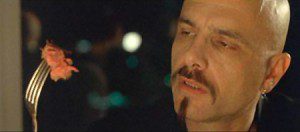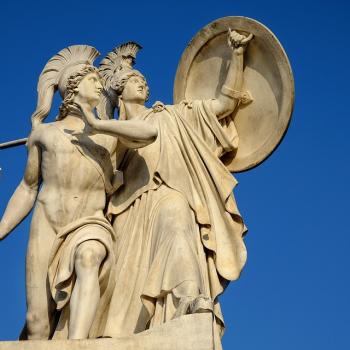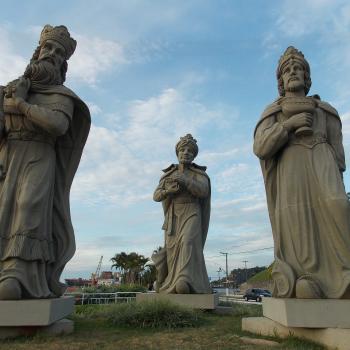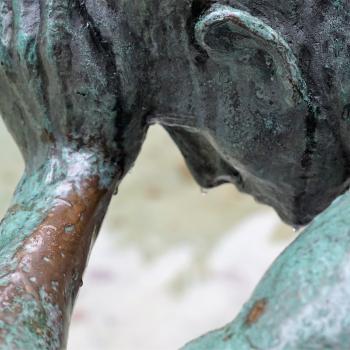I want to begin this part of the conversation acknowledging a comment to my last post about a sense of need. Nick astutely writes:
My big problem with “God shaped hole” arguments is that it seems to me that I would have to accuse an awful lot of people of living in, at the very least, self-deception about their own obvious unhappiness. If Pascal is right then, to use just one sort of unbeliever, there can be no such thing as a truly happy atheist. At most he/she will be living a numb and debauched life at the bottom of Pascal’s list.
But I’ve seen lots of happy atheists and I’ve also seen lots of moral atheists. I have to take their word about their own inner state and they seem to be perfectly content with honestly believing that they have no need of Pascal’s God.
The conundrum of the happy atheist. The contented dilettante. The apathetic, uninterested, indifferent—but satisfied—soul in the face of the call to faith. They really shouldn’t exist, right? We should be either filled with God or left hungry.
But they do exist. Lots of them. Quite satisfied with a life that a) believes there is probably a god somewhere but that it has nothing much to do with me and therefore I can live as I please (deism), or b) sometimes wonders if there is a god or not, but doesn’t think we can really know or that it really matters, and that therefore I can live as I please (agnosticism), or c) believes there is no god anywhere and that therefore I can live as I please (atheism). These people are not necessarily miserable or immoral; they can be good citizens, helpful neighbors, congenial co-workers, and brilliant contributors to society in many ways.
Then what exactly are we talking about? If we can be happy without God, useful without God, successful without God, content without God, what’s the point? If I do indeed have a spiritual crevasse at the center of my soul—which, Pascal insists, we all do—but I can build a dandy life without ever encountering a moment’s distress about wretchedness or despair or personal poverty or nothingness, why not?
My advice to myself when such thoughts arise is this: If that is the way you think, feel free. Go right ahead. Turn your back on the abyss or build something really big and jolly right in front of it so that its shadows don’t darken your horizons. This is human choice at its deepest level. This is what Pascal addresses in the Wager: we all must place our bets. Act as though it isn’t there. Believe it isn’t there. It doesn’t change anything at all except the teleological arc of your existence, but that is what the Wager is all about.
And then I sit with that option, mull it over, and wonder if that is a choice I really wish to make. And yes, I have seriously considered it.
 I love the scene in The Matrix when Cypher, the villainous traitor, sits in the Matrix with Agent Smith, eating a steak, relishing it, and says, “You know, I know this steak doesn’t exist. I know that when I put it in my mouth, the Matrix is telling my brain that it is juicy and delicious. After nine years, you know what I realize? Ignorance is bliss.” The temptation to generate a closed universe in my mind and populate it with the gods of my own choosing is great. But, as Neo learned, reality beckons. And (most of the time) I want the raw truth more than I want blissful ignorance.
I love the scene in The Matrix when Cypher, the villainous traitor, sits in the Matrix with Agent Smith, eating a steak, relishing it, and says, “You know, I know this steak doesn’t exist. I know that when I put it in my mouth, the Matrix is telling my brain that it is juicy and delicious. After nine years, you know what I realize? Ignorance is bliss.” The temptation to generate a closed universe in my mind and populate it with the gods of my own choosing is great. But, as Neo learned, reality beckons. And (most of the time) I want the raw truth more than I want blissful ignorance.
Placing your bet on God is simply a way of acknowledging that this is the direction you choose to face, this is the risk you are willing to take. It is your recognition that the happiness you could create, achieve, or acquire on your own will not ultimately be enough. Only those who actually decide to “make belief” will abandon the shiny city off in the distance far away from the abyss and creep near the edge to peer down into the darkness and wonder and long for what is on the far side.
I called this business of “peering” the First Step. Perhaps I should have written it steppe. I remember as a child reading The Endless Steppe, by Esther Hautzig, first published in 1968 and reissued in 1995. This is Esther’s memoir, her account of her family’s 1941 exile to a forced labor camp in Siberia where they together encountered starvation, slave labor, sickness, and loss. It was a haunting story, and yet the part that struck me most vividly as a child is that she became so used to life on the steppe—those vast, treeless, endless sweeps of grassland, cold and windy—that when they were released to return to Poland, she did not want to leave. She did not want to go home. I was shocked. I could not imagine not wanting to go home.
The First Step is like that steppe; many of us spend long periods in our lives simply taking that first step, and sometimes we have to go back and take it again and again. (The spiritual life is rarely linear.) We spend so long on the steppe that sometimes we forget what home really is. And yet circumstances, obstacles, events, books read, words spoken like arrows into our hearts, and even tragedies all may inch us ever nearer the edge of that abyss in our souls.
And then what? What happens when we’ve made the decision to uproot ourselves from our steppes and go home? We’ve placed our bet, we’ve reached the edge, we’ve descended into the darkness. Now what?
Pascal calls the next step “the Machine”:
A letter of exhortation to a friend, to induce him to seek. He will reply: “But what good will seeking do me? Nothing comes of it.” Answer: “Do not despair.” Then he in turn would say that he would be happy to find some light, but according to religion itself it would do him no good even if he did thus believe, and so he would just as soon not look. The answer to that is “the Machine.” (f. 5)
The Machine is Pascal’s epithet for what we might call “self-conditioning,” changing the “input” so that the “output” changes. [As an aside, we could explore Pascal’s whole imagination around this image, arising as it does just before the onset of the Industrial Revolution. But let’s not. For now.]
Now, I grant you: the Machine image is cold, calculating, unfriendly. Elsewhere he calls it the automaton. That’s even less warm and fuzzy. Here is one such description:
For we must make no mistake about ourselves: we are as much automaton as mind. As a result, demonstration is not the only instrument for convincing us. How few things can be demonstrated! Proofs only convince the mind; habit provides the strongest proofs and those that are most believed. It inclines the automaton, which leads the mind unconsciously along with it. Who ever proved that it will dawn tomorrow…? In short, we must resort to habit once the mind has seen where the truth lies, in order to steep and stain ourselves in that belief which constantly eludes us . . . . We must acquire an easier belief, which is that of habit… (f. 821)
Now, if you’ve been tracking with this series, you will (should) begin to protest. This is what I would say if I were you: HOLD ON ONE MINUTE HERE MISSY! Habit? Habit? Did we not say earlier that customs, habits, traditions alone are just as useless as reason in actually producing faith? Are you now telling me that if I just go through the motions it’ll eventually “stick”? Fake it ‘til you make it? Is that your second step? (And then I would say to myself, “Sheesh. Stop it already.”) And if that were the whole business of this second step, I would agree with you.
But that isn’t quite right. It isn’t the key to Pascalian spirituality. Here is the end of that fragment:
When we believe only by the strength of our conviction and the automaton is inclined to believe the opposite, that is not enough. We must therefore make both parts of us believe: the mind by reasons . . . and the automaton by habit, and not allowing it any inclination to the contrary: Incline my heart. (f. 821, emphasis in the original)
Okay. Let’s sit with this a minute. This is what Pascal is arguing: If our reason leads us to some worthy, but limited, conclusions (“we believe only by the strength of our conviction”) but our habits are generally geared toward and revolve around non-belief (“the automaton is inclined to believe the opposite”), we will never come to faith. Or: 1) if reason tells us that this is a bet worth making, that enough evidence is available to make belief or non-belief a matter of risk rather than certainty; but 2) our habits, our personal conduct, bespeak a broad lack of belief because we don’t practice the kinds of things we would practice if we did believe; then we will be torn in opposite directions and will never be able to take a step toward real make-believe faith.
So far, so good. But we have already heard Pascal tell us that reason + habit do not = faith. We can “fake it” all day long with all the rational good will we could muster, and that, Pascal insists, is not faith.
Where does that leave us?
It leaves us with the last three words of that last quote: incline my heart. I warned you that the Pascalian key was le coeur, the heart.
Incline my heart.
This, I might suggest, is the only prayer worth praying when we are searching for faith. We might want to pray for some glorious experience, as Pascal had, or we might want to pray for “evidence that demands a verdict.” But the reality behind all this is that, if we are searching for faith, our only hope is desire. Holy desire.
Incline my heart.
We could stop here and spend weeks on this business of desire—where it comes from, why some have it and some don’t, why we would desire/hunger so deeply and so long without any abatement or satisfaction, what it looks like, how it works, etc. If you go too far into the “desire paradox,” you’ll start fighting all kinds of theological battles that will take you far afield from what I’m assuming your primary interest is: making belief. Suffice it to say, that Pascal is not alone in understanding the sterling value of desire. Listen to some of these great voices:
C.S. Lewis in talking about the difference between hypocrisy and “faking it” (what we’re calling habit, or “the Machine”): “There is a bad kind, where the pretense is there instead of the real thing; as when a man pretends he is going to help you instead of really helping you. But there is also a good kind, where the pretense leads up to the real thing. When you are not feeling particularly friendly but know you ought to be, the best thing you can do, very often, is to put on a friendly manner and behave as if you were a nicer person than you actually are. And in a few minutes, as we have all noticed, you will be really feeling friendlier than you were. . . . Let us pretend in order to make the pretence into a reality.”
Lewis recognizes that “faking faith,” if indeed that is what you really desire, is no hypocrisy—it’s an instrument of will, an embodiment of your choice.
St. Augustine, in commenting on 1 John 3.1-3: “… because at present you cannot see, make it your business to desire the divine vision. The entire life of a good Christian is in fact an exercise of holy desire. You do not yet see what you long for, but the very act of desiring prepares you, so that when he comes you may see and be utterly satisfied.”
Augustine recognizes desire as a powerful extension of the soul, two hands reaching out from the depths of our heart—empty hands, yes, but ready and open to receive.
Charles Spurgeon, preaching about the utter dearth of spiritual vitality: “There are times when all the saints can do is to desire. . . . He will have lost assurance and with it his enjoyment of communion with God. . . . he has forgotten it, and it does not come, and Satan whispers it is a fancy, and the poor evidence of communion has its mouth gagged, so that it cannot speak. But there is one witness that very seldom is gagged, and one that I trust the people of God can always apply, even in the night; and that is, ‘I have desired thee, I have desired thee in the night.’ ‘Yes, Lord, if I have not believed in thee, I have desired thee; and if I have not spent and been spent in thy service, yet one thing I know, and the devil cannot beat me out of it, I have desired thee—that I do know—and I have desired thee in the night, too, when no one saw me, when troubles were round about me.”
Spurgeon knows that when, spiritually speaking, we are impoverished to the point of desperation, the mere desire for God—even when there is no other sign of faith—can indeed sustain us.
Julian of Norwich, on her unquenched longing for God: “Finding God in clarity is a gift of his special grace, and comes when he wills. The seeking of him with faith, hope, and charity pleases our Lord; the finding of him pleases the soul and completely fills it with joy. Thus was my understanding taught that seeking is as good as seeing, during the time God allows the soul to labor in distress. It is God’s will that we seek him until we behold him, for it is by this means that God, of his special grace, will show himself to us when he wills. . . . For a soul that simply fastens itself to God with absolute trust, in either seeking or in seeing, does the greatest honor to God it can do, as I see it.
“The seeking is a common work which every soul can do with God’s grace . . . It is God’s will that we have three things in our seeking of him. The first is that we seek him determinedly and diligently without sloth, as well as we can, through his grace, and that we do so gladly and merrily, without unreasonable depression and vain sorrow.
“The second is that for love of him we wait for him steadfastly, without grumbling and striving against him, to the end of our lives: for it will only last for a little while.
“The third is that we trust very strongly in him, in the full certainty of faith. For it is his will that we know that he shall appear suddenly and blissfully to all his lovers. His working is in secret, and yet he wills to be perceived; his appearing will be very sudden, and he wills to be trusted, for he is very near at hand, friendly and courteous, blessed may he be!”
Julian. I saved Julian for last because her words are so rich for me. “Seeking is as good as seeing.” Wow. We cannot see? We mustn’t despair. Seeking is as good as seeing. We wait in the dark, alone? Never fear. He works in secret, and he is very near at hand.
Yes, Pascal recommends the manner of seeking—habit, the Machine, the automaton. But habit alone is nothing but a rote accommodation of custom or tradition. You can have quiet times every day for the rest of your life, go to church without fail, say as many prayers as you like, do every Bible study that comes your way, give generously to every charity, avoid every gross sin … whatever … and it will not add up to faith.
But if you add that single ingredient—desire—you will make your actions into channels of faith down which grace can flow. Make your habits into visible expressions of your inner desire. You have no faith but you want it? (Because, of course, if we don’t really want it, then we go back to square one, where we have placed our bet on the non-existence of God.) Make belief, Pascal tells us, by incarnating your spiritual yearning, by operating out of the depths of le coeur.
“(My) hands are tied and my lips are sealed; I am being forced to wager and I am not free; I am being held fast and I am so made that I cannot believe. What do you want me to do then?”—“That is true, but at least get it into your head that, if you are unable to believe, it is because of your passions, since reason impels you to believe and yet you cannot do so. Concentrate then not on convincing yourself by multiplying proofs of God’s existence but by diminishing your passions. You want to find faith and you do not know the road. You want to be cured of unbelief and you ask for the remedy: learn from those who were once bound like you and who now wager all they have. These are people who know the road you wish to follow, who have been cured of the affliction of which you wish to be cured: follow the way by which they began. They behaved just as if they did believe, taking holy water, having masses said, and so on. That will make you believe quite naturally, and will make you more docile.”—“But that is what I am afraid of.”—“But why? What have you to lose? . . . I tell you that you will gain even in this life, and that at every step you take along this road you will see that your gain is so certain and your risk so negligible that in the end you will realize that you have wagered on something certain and infinite for which you have paid nothing.” (f. 418)
Now, we haven’t quite finished our work on neo-Pascalian spirituality. There’s something in that paragraph—fragment 418—that merits a closer look.
___________________
Note to Reader: This series on Becoming Neo-Pascalian considers some of the ways Blaise Pascal (1623-1662) speaks into the 21st century. It draws from my own research, published in Beyond the Contingent (2011), and citations are from the book, unless otherwise noted. The beginning of the series is here: Introduction.












